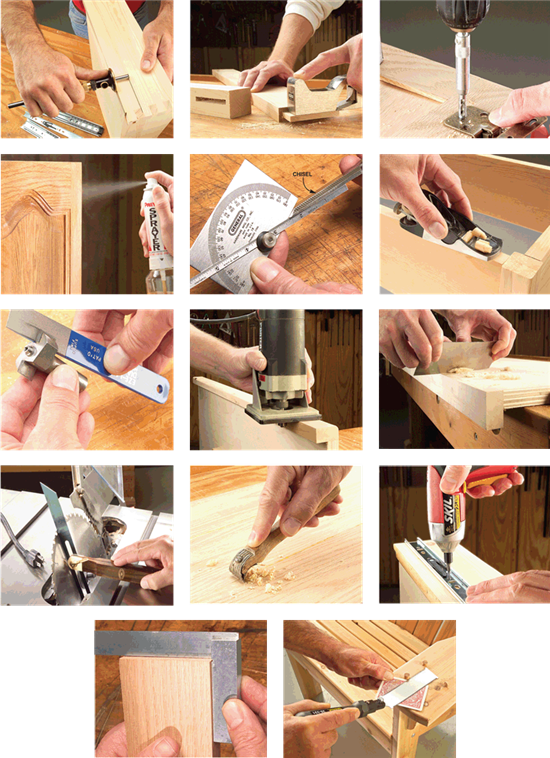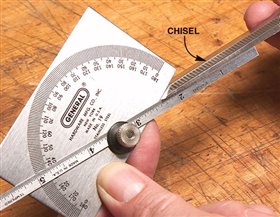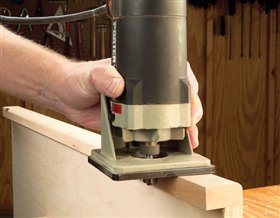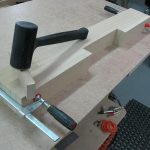We may receive a commission when you use our affiliate links. However, this does not impact our recommendations.

14 Great Little Tools
Time-tested and woodworker-approved, here are some of our favorite workaday tools
By George Vondriska
“What tools do I need for my shop?” This has to be one of the most common question in woodworking. The answer usually starts with the big power tools: tablesaw, jointer, router, planer. But what about those everyday tools we take for granted? You know, the kind that cause you to turn to a shopmate and say, “This is a great little tool.”
I polled the American Woodworker editors and compiled a list of some of our favorite tools. Most of the picks cost less than $100—way less. Here, in no particular order, is a short list of time-tested, woodworker-approved, great little tools.
Marking Gauge
Marking gauges are handy for all kinds of marking needs. Use one to scribe a line on a drawer side to locate mechanical slides or mark the depth of dovetails. I also use a marking gauge to lay out a board for resawing. After setting the gauge by eye to approximately the middle of the board, scribe a line with the gauge indexed off of one face and then scribe a second line with the gauge indexed off the opposite face. This almost always gives me a pair of lines that form a perfect track for my bandsaw blade to travel in as I resaw. If my eyes are really on the money, I get a single fat line to follow.
Source
Lee Valley, leevalley.com, 800-871-8158, Veritas Micro-Adjust Marking Gauge, #05N35.10, $36.50. |
|
 |
Rabbet Plane
A rabbet plane has an iron that goes all the way to the edge of the body so you can plane up to a shoulder. It’s the perfect choice to shave down a tenon for a snug fit. The Stanley 93 shown here is actually two planes in one. Loosen the knurled knob at the top and the lower unit drops out as a chisel plane. On a chisel plane, the blade sticks out the front, which makes it ideal for removing glue, cleaning up the corners in a hinge mortise or trimming plugs. This tool may not fall into your daily-use category, but when you need it, you can’t beat it.
Source
Highland Hardware, highlandwoodworking.com, 800-241-6748, Stanley 93 Rabbet/Chisel Plane, #431805, $130. |
|


|
Self-Centering Drill Bit
Self-centering drill bits are the best way to locate screws in hardware. The tapered nose of the bit nestles into the countersunk screw hole in the hardware. Just run the drill and push the bit into your work. The pilot hole is perfectly centered every time. Various sizes are available to match the size of the screws you’re using.
Source
Woodcraft Supply, woodcraft.com 800-225-1153, Set of Three
Self-Centering Bits, 5/64 in., 7/64 in. and 9/64 in., #16I40, $29. |
|
 |
Pocket-Size Sprayer
Use a pocket-size sprayer when just a little dab will do ya. Got a touch-up to do? Fill the jar with finish, screw on the aerosol can, and let it fly. One can will spray about 16 oz. of liquid. This is also an easy way to make samples with different stains and finishes before you do the real thing. Sure beats cleaning out a whole spray-gun assembly for each sample.
Source
Woodcraft Supply, woodcraft.com 800-225-1153,
Preval Spray Gun, Jar and Power Unit, #142198, $5.50. |
|
 |
Sliding Protractor
A sliding protractor can’t be beat for measuring angles. I use it to check the bevels on my plane irons and chisels. The skinny arm not only pivots to indicate the angle but can be adjusted for length by loosening the knurled lock knob. I’ve used a sliding protractor to set the table on my drill press to drill angled holes for spindles in chair seats. The sliding arm can also be used to measure the depths of holes or mortises, even if they are cut at an angle.
Source
MSC Industrial Supply, mscdirect.com, 800-645-7270, Sliding Protractor, #06475198, $22.75. |
|
 |
Low-Angle Block Plane
A low-angle block plane is great for fine-tuning misaligned parts. With its low cutting angle, you can even skin gossamer shavings off of end grain. This small-bodied plane fits comfortably in one hand, allowing you to hold the part being planed with the other. It’s even small enough to travel around in your apron pocket, so it’s always right at hand when you need it.
Source
Lee Valley, leevalley.com, 800-871-8158, Apron Plane, #05P27.01, $85. |
|
 |
Diamond Paddle
Diamond paddles can help you touch up an edge on a tired router bit. The paddles are embedded with industrial diamonds—abrasives that can sharpen carbide. The Hone and Stone paddle shown is small enough to fit under the flutes of a router bit and in your pocket. You can also use the paddles to freshen the edges on drill bits, hone scrapers, sharpen your pocket knife—you’ll find many uses for this handy little tool.
Source
Eze-Lap, eze-lap.com, 800-843-4815, Hone and Stone Diamond Paddle, Fine or Super-Fine Grade, $4.95 ea. |
|
 |
Trim Router
A trim router allows routing with one hand. It makes quick work of rounding over cabinet parts. One-handed operation allows you to hold the piece in one hand and run the router with the other. The one-handed operation and small stature are also real boons if you need to manipulate the router in an awkward spot.
Source
Home centers and woodworking stores ($100-$200). |
|
|
Card Scraper
A card scraper may not be much to look at, but it provides an indispensable way to remove tissue-paper-thin shavings. Worried about sanding through a veneer? Try a scraper. Tired of sanders that are noisy and raise lots of dust? Try a scraper. There’s an art to sharpening it, but once you master that, you’ll reach for this tool often.
Source
Lie-Nielsen Tool Works, lie-nielsen.com, 800-327-2520, Hand Scraper Set, #HSset, $15. |
|
|
Sliding Bevel
A sliding bevel is one of the best ways to transfer angles from one surface to another. The blade slides and pivots within the head and can be locked with a turn of a lever or thumb screw. The sliding bevel works great for laying out dovetails. With the blade extended out both sides of the handle, you can flip-flop the bevel as you scribe each angled side of a pin or tail.
Source
Home centers and woodworking stores ($20 to $50, depending on size). |
|
 |
Paint Scraper
A 1-in. paint scraper may not be considered a traditional woodworking tool, but it can’t be beat for scraping a glue joint. Grind or file a burr edge on the blade and this little paint scraper is capable of much more than simply scraping glue. Use it to shave hardwood edge banding or face frames flush with veneered panels. Its size makes it easy to control and the flared blade allows you to get right into corners.
Source
Home centers and woodworking stores (about $5). |
|
 |
Small Lithium-Ion Drill
Palm-size lithium-ion drills are small but powerful little tools. Instead of grabbing a monster drill/driver, try one of the little ones, like the Skil ixo. It’ll fit in the pocket of your apron, so it’s there when you need it. The lithium-ion battery packs a lot of power in a smaller package than NiMh or NiCad batteries. This little drill can drive screws as long as 1-1/2 in., but it really shines on such tasks as mounting drawer guides and door hinges. Plus it fits in tight spaces where other drills can’t go.
Source
Home centers and hardware stores (Skil iXO, about $40). |
|
 |
Engineer’s Square
A small engineer’s square is ideal for quickly checking project pieces for square. Use it to create layouts, check cuts fresh off your miter saw, set the 90-degree stop on your tablesaw or square the fence on your jointer to the table. Carry this little square around in your apron pocket and I guarantee you’ll reach for it all the time. By checking as you build, you’ll avoid aggravating mistakes that cause problems at assembly time.
Source
Woodcraft Supply, woodcraft.com 800-225-1153, Engineer’s Square,
2-in. Blade, #141013, $15.99. |
|
 |
Flush-Cut Saw
A flush-cut pull saw is great for trimming off dowels you’ve left proud. The blade bends enough that you can keep it flat on your work while bringing the handle up to a comfortable angle. The fine teeth leave a smooth cut and won’t score your work. Still, I recommend laying down a playing card just in case.
Source
Home centers and hardware stores (Stanley flush-cut saw, about $18).
This story originally appeared in American Woodworker Dec/Jan 2007, issue #126.

Dec/Jan 2007, issue #126
Purchase this back issue. |
|
 |
Product Recommendations
Here are some supplies and tools we find essential in our everyday work around the shop. We may receive a commission from sales referred by our links; however, we have carefully selected these products for their usefulness and quality.
























